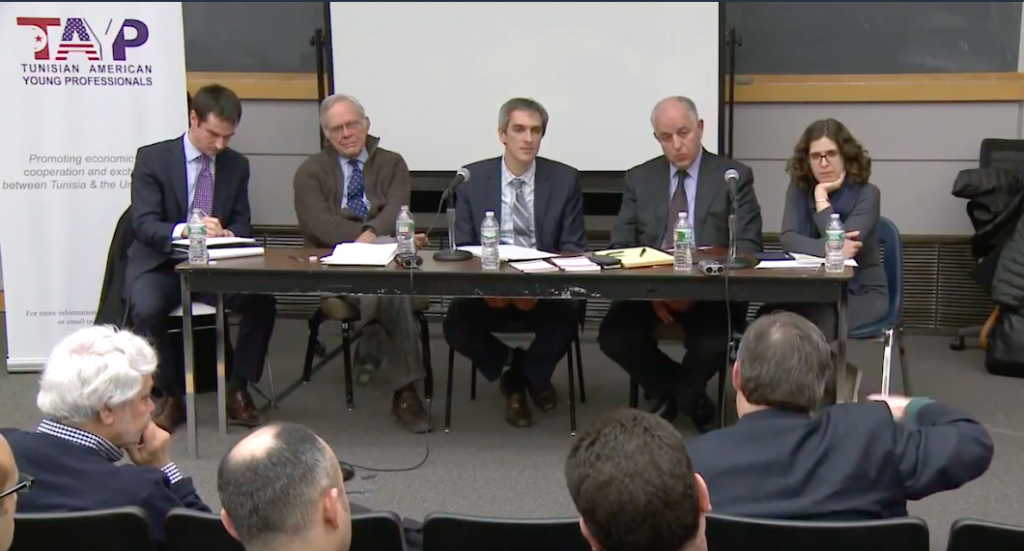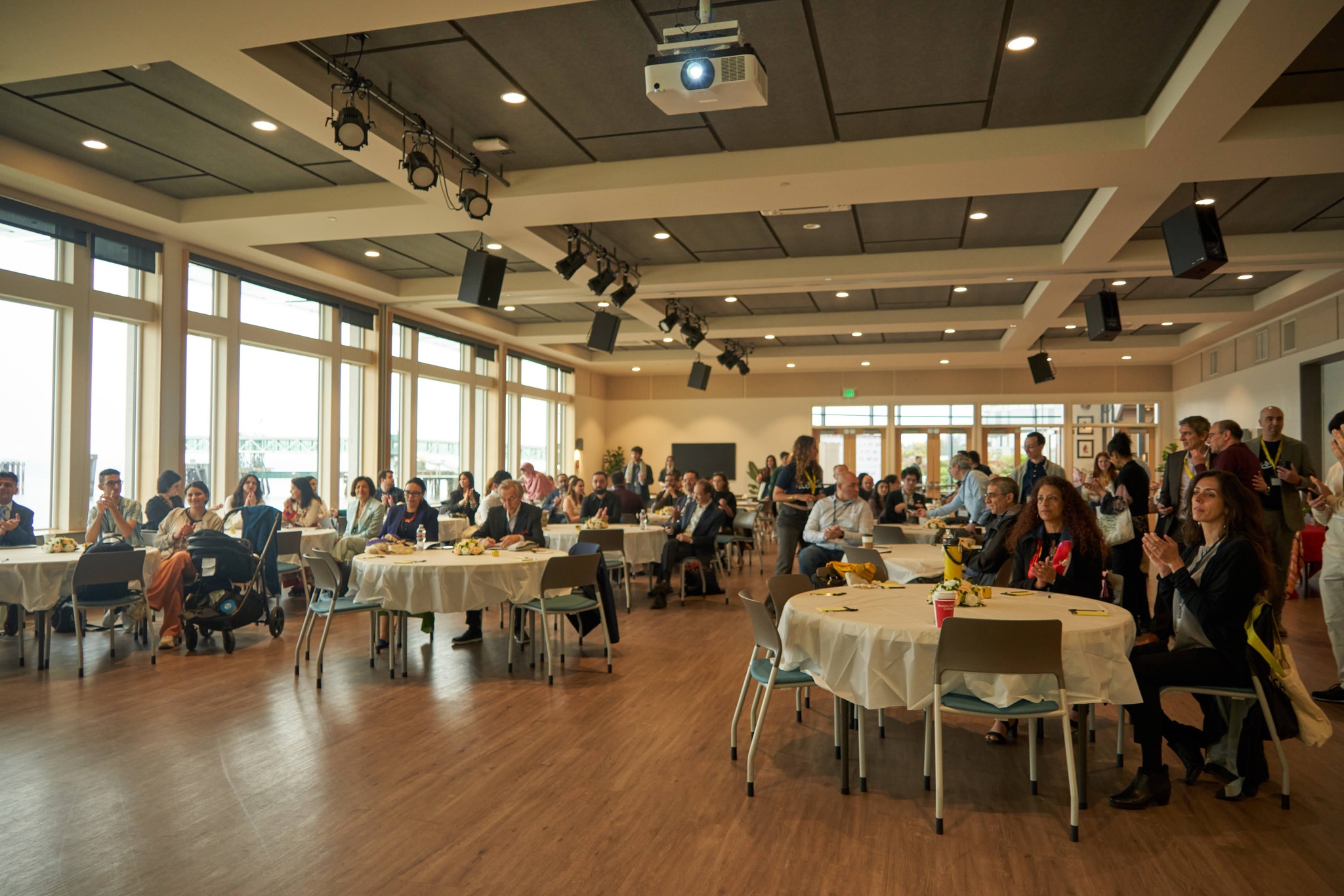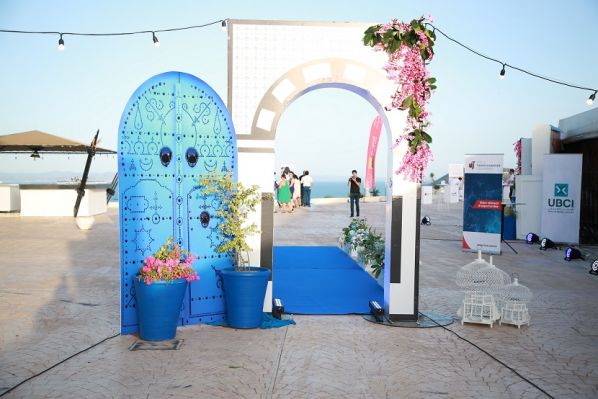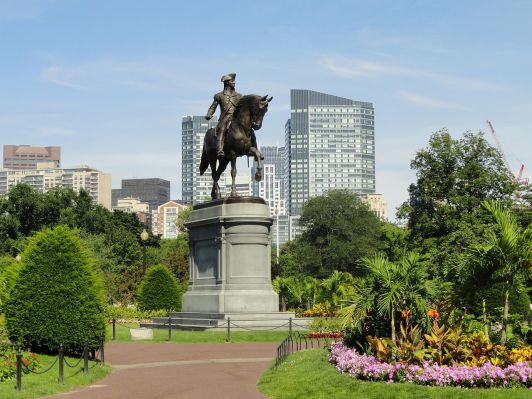Tunisia what lies ahead- Panel discussion Takehome Message

In light of the recent development in Tunisia, the jointly with the Young Professionals in Foreign Policy (YPFP), the Tunisian American Young Professionals organized a round table discussion on March 4, 2014 at George Washington University under the theme “ Tunisia’s journey: what lies ahead?” exploring the country political, economic and security challenges and what can be done to overcome these challenges. Panel discussion video recording.
The panel featured Mustapha Kamel Nabli, former Tunisian Central Bank governor, Bowman Cutter Chairman of the Tunisian American Enterprise Fund, Alexis Arieff director of Congress Research Services analyst and Steve McInerney, executive director of POMED. Mohamed Malouche, TAYP Board Chairman moderated the discussion and delivered the opening remarks.
The panelists made an assessment of the political, economic and security situation in Tunisia and put forward some ideas and measures that can be taken to maintain the momentum and the positive energy brought by the recent development of adopting the Constitution and the installation of a new care-taker government. The issue of whether this government has the latitude and the leverage to undertake these measures has also been debated.
Mr. Nabli highlighted the factors that led to the current Tunisian economic and social challenges. Although tempered by the adoption of the new constitution and the installation of a new government, they still exist and may resurface in the future. These challenges are the emergence of violence whether terrorist or political, the political polarization of the Tunisian society, and the major concern for Mr. Nabli remains the financial and economic situation.
Mr. Nabli also expressed his concern that Tunisia economic and social condition may be worsening despite the positive development that has occurred recently. Tunisia is confronted with two choices in dealing with the fiscal deficit: spend more to stimulate the economy and create jobs or reduce expenditures and cut benefits. The Tunisian Government borrowing increased by DT 500 millions going from DT 1.5 billions to DT 2.0 billions. There is little investment in the private sector, which is the vehicular of the economic growth.
Mr. Nabli proposes a national dialogue on the economy similar to the one held on the political front, because, a consensus will lower the social tensions and lead to a peaceful second round of elections.
Mr. Cutter examined the five accolades of the Tunisian economy: ease of doing business, economic competitiveness, human development, economic freedom and entrepreneurship and development. On all theses indexes, he measured that Tunisia is in “the middle of the pack” with the exception of the entrepreneurship and development where Tunisia scores rather poorly.
As a chairman of the Tunisian American Enterprise Fund, Mr. Cutter reiterated that the purpose of the fund is to be an added development tool for the private sector. The fund is trying to do 3 things:
1- Build a small number of sustained profitable investments platforms by economy sector
2- Raise more money to support and sustain those platforms
3- Build an investment bridge between Tunisia and the American private sector.
Mr. Nabli and Mr. Cutter questioned the ability of the current government, being a government of transition to tackle these economic pressing issues, however they both believe that the government cannot afford to do nothing.
Mrs. Alexis Arief considered that Tunisia has always been seen as having the best chances of a peaceful transition to democracy and recent development have justified this optimism. However, the past three years reminded us about political and security challenges that remain to be resolved.
Mrs. Arieff pointed out the mistrust between Secularists and Islamists and the mutual suspicion that each side is seeking to manipulate the rules of the game to exclude the other party. The constitution was an enormous step to fade these fears, but she thinks that they will resurface during the next electoral process along with other issues of national importance like freedom of speech and religion.
The second challenge according to Mrs. Arieff will be how to deal with violent extremists active on Tunisian borders.. The extremists want to capitalize on divisive national identity issues as well as popular frustrations with the slow pace of reforms. The recent clashes between security forces and extremists led secularists to blame the government as overly timid. On the other hand, Islamists considered them as unjust. This underscores the Tunisian leaders delicate challenge of countering terrorism without resorting to the authoritarian tactics of the old regime.
Mr. McInerney also noted the historical nature of the progress that have been made in Tunisia. Although this success did not impact other countries in the region, Mr. Mc Inerney thinks that further sustained political success accompanied by economic developments would eventually impact other countries and set a Tunisia as a regional model for democratic transition. .
Mr. Mc Inerney considered that the United States should do more to support Tunisia’s transition to democracy and that such support could take different forms. It could be symbolic support such as the brief visit of Secretary of State John Kerry to Tunisia and President Obama invitation to Prime Minister Jomaa to Washington. It could also be tangible support such as removing the “travel warning” to Tunisia as it is disproportionate with the reality on the ground. The travel warning also sends a negative message to the international business community.
Finally, US Government and international donors should provide economic assistance. This will help Tunisian leaders to make difficult economic and reform decisions and manage the short-term consequences of such decisions.
related news




About the author
Amina Laouani